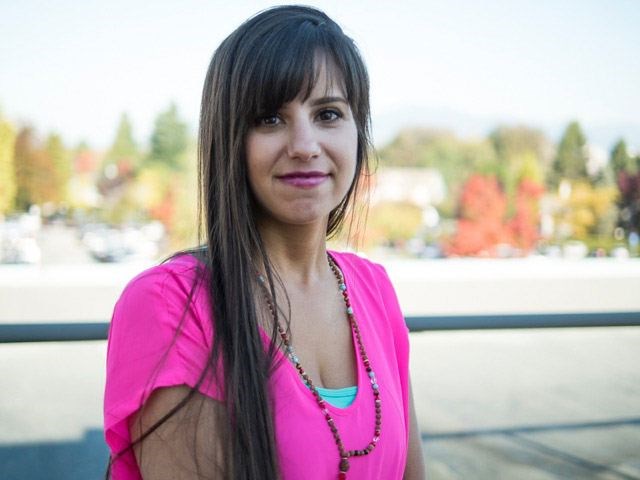Today, Amy Pezzente can see all the red flags that emerged in her youth for what they were.
But at the time, she didn't have a name for her illness.
"I didn't know what I was engaging in. I had never even heard of an eating disorder," said Pezzente, who lives in the North Shore.
Some 18 per cent of adolescent Canadian girls experience an eating disorder, according to the National Initiative for Eating Disorders. And, at any given time, as many as 600,000 to 990,000 Canadians suffer from the three most serious manifestations: anorexia nervosa, bulimia nervosa, or binge eating disorder, according to a 2014 report to the Standing Committee on the Status of Women.
In Pezzente's teenage years and early adulthood, she perceived her actions - and eventual anorexia - as a path to happiness.
"No one understood me but the voice in my head, and the voice was the eating disorder. It was me in my own perfect world, my own shell," said Pezzente, now 31.
"It made me feel good about myself: I'm reaching my goals. It made me feel like I was good at something. It made me feel like I was capable, I had control."
But it was also killing her.
Anorexia, while the rarest of the eating disorders affecting 0.5 to four per cent of Canadians, has the highest mortality rate of any psychiatric illness, according to the Toronto-based National Eating Disorder Information Centre (NEDIC).
It's estimated that 10 per cent with the illness will die within 10 years from the effects of that disorder or by suicide.
While binge-eating affects both genders similarly, women account for 90 per cent of the anorexia and bulimia cases, according to Canadian Mental Health Association. It's most common among youth and tends to run in families.
"People talk about the voice," said Pezzente, who offers online support in chat rooms through the Looking Glass Foundation.
"It's the eating disorder's voice telling you you're not good enough, you're not thin enough."
She compared it to having a prison guard in your mind.
"It's pretty much like living in hell with a bully in your head," said Pezzente, who co-ordinates the Provincial Eating Disorders Awareness campaign.
At 23, Pezzente went through months-long treatment centre at St. Paul's Hospital, then participated in its outpatient program and it was years after that before she felt she had rebuilt her life.
Local support
Pezzente is a passionate advocate for provincial efforts to address disordered eating, self-esteem, and body image.
This week, the City of Prince George declared an upcoming Eating Disorder Awareness Week, from Feb. 1 to 7.
"In the rural areas I'm finding it a little quieter. There are people struggling with eating disorders... Prevention is needed everywhere across B.C." she said.
Pezzente recommended calling the Kelty Eating Disorders at 1-800-665-1822 as a good first step for anyone with questions.
Northern Health's eating disorders clinic in Prince George serves as a local resource. It has around 50 active clients and the nurse sees as many as three to four new patients each week, said clinic team leader Sandi DeWolf.
"The recovery is more likely the earlier you intervene," said DeWolf, calling the team a multidisciplinary group.
That includes a pediatrician, dietician, nurse and youth and adult therapist.
The team is also looking for a new general practitioner after the doctor left in December.
"The ideal goal is to treat people in the community."
Those who need treatment centres like Pezzente must travel to St. Paul's or BC Children's Hospital in Vancouver.
She had to wait more than a year for entry but said the waitlists have become shorter in recent years.
St. Paul's Hospital has 19 people on a waitlist for the seven beds available at its in-patient clinic.
That translates to a six to eight week wait list, said Providence Health Care spokesman Justin Karasick and the length of the person's stay is entirely patient-specific.
That can give patients time to prepare for the program, with consultation support from the clinic.
"They're referred to community programs. It's also working time where individuals are preparing for the hospital program," he said. "Not all people are ready for the inpatient programs. They have to want in."
The Prince George clinic runs a weekly support group called Craving Change that is starting up soon and often has a wait list. It also provides regional support, which can be challenging based on staffing and resources in communities, she said.
Changing the conversation
For Pezzente, "awareness" is more than a buzzword.
"It's more to have people acknowledge this happens. For parents, so that it's on their radar," she said. "I know with my mom, she'd say 'Amy is just a picky eater.' She didn't once fathom it was an eating disorder."
There were some signs that others could have spotted, if they'd known. Pezzente became a vegetarian, started isolating herself from friends. She loved to bake, but she'd never eat the food.
"I think it behooves all of us to be mindful about making comments around weight and shape," said DeWolf.
Pezzente echoed that advice, adding those in mentorship roles – parents, teachers, leaders - especially need to understand the impact of those words.
As many as 40 per cent of nine year-old girls have dieted to lose weight, according to the National Eating Disorder Information Centre estimates.
Why does that matter? A study looking at 14 and 15 year olds who did "strict dieting" found that they were 18 times more likely to develop an eating disorder than non-dieters.
The focus needs to be on better body acceptance, said DeWolf.
"It's terribly secretive and lots of shame around the illness," DeWolf said. "There's so many different messages out there about how we should be with our bodies. The (awareness week) is really to try to take a focus of: be good to ourselves."



